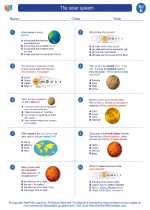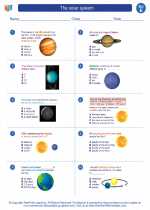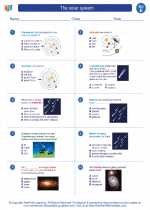Geological Time Scale
The geological time scale is a system of chronological dating used by geologists, paleontologists, and other earth scientists to describe the timing and relationships between events that have occurred throughout Earth's history. It is divided into several periods, epochs, and ages based on significant geological and biological events.
Major Divisions of the Geological Time Scale
The geological time scale is divided into four major divisions: eons, eras, periods, and epochs.
- Eons: The largest division of time, representing the greatest expanse of geological time. The current eon is the Phanerozoic eon, which began around 541 million years ago.
- Eras: Each eon is divided into eras, which are characterized by significant geological events and changes in the fossil record. The Phanerozoic eon is divided into three eras: the Paleozoic, Mesozoic, and Cenozoic eras.
- Periods: Eras are further divided into periods, each marked by distinct geological and biological features. For example, the Paleozoic era is divided into the Cambrian, Ordovician, Silurian, Devonian, Carboniferous, and Permian periods.
- Epochs: Periods are sometimes further divided into epochs, which represent shorter intervals of time characterized by specific developments in the fossil record or geological history.
Importance of the Geological Time Scale
The geological time scale provides a framework for understanding the evolutionary history of life on Earth and the geological processes that have shaped the planet. It allows scientists to correlate rock layers and fossils from different regions, and to study the timing of major events such as mass extinctions, climate changes, and the formation of important geological features.
Key Concepts to Understand
When studying the geological time scale, it's important to understand the following key concepts:
- Fossils: The remains or traces of organisms preserved in rocks, which provide valuable information about past life forms and the environments they lived in.
- Stratigraphy: The study of rock layers (or "strata") and their relationships, used to determine the relative ages of geological formations and the fossils they contain.
- Index Fossils: Fossils of organisms that lived for a relatively short period of time and are used to define and identify specific time intervals in the rock record.
- Radioisotopic Dating: The technique used to determine the absolute ages of rocks and fossils by measuring the decay of radioactive isotopes.
Practice Questions
- What are the major divisions of the geological time scale?
- How does the geological time scale help scientists understand Earth's history?
- What are index fossils and how are they used in the study of the geological time scale?
- Explain the difference between relative dating and absolute dating in the context of the geological time scale.
Studying the geological time scale is an important part of understanding Earth's history and the processes that have shaped the planet over billions of years. By mastering this topic, you'll gain valuable insights into the deep time scale of our planet and the evolution of life on Earth.
[Geological Time Scale] Related Worksheets and Study Guides:
.◂Science Worksheets and Study Guides Fifth Grade. The solar system

 Worksheet/Answer key
Worksheet/Answer key
 Worksheet/Answer key
Worksheet/Answer key
 Worksheet/Answer key
Worksheet/Answer key
 Vocabulary/Answer key
Vocabulary/Answer key
 Vocabulary/Answer key
Vocabulary/Answer key
 Vocabulary/Answer key
Vocabulary/Answer key
